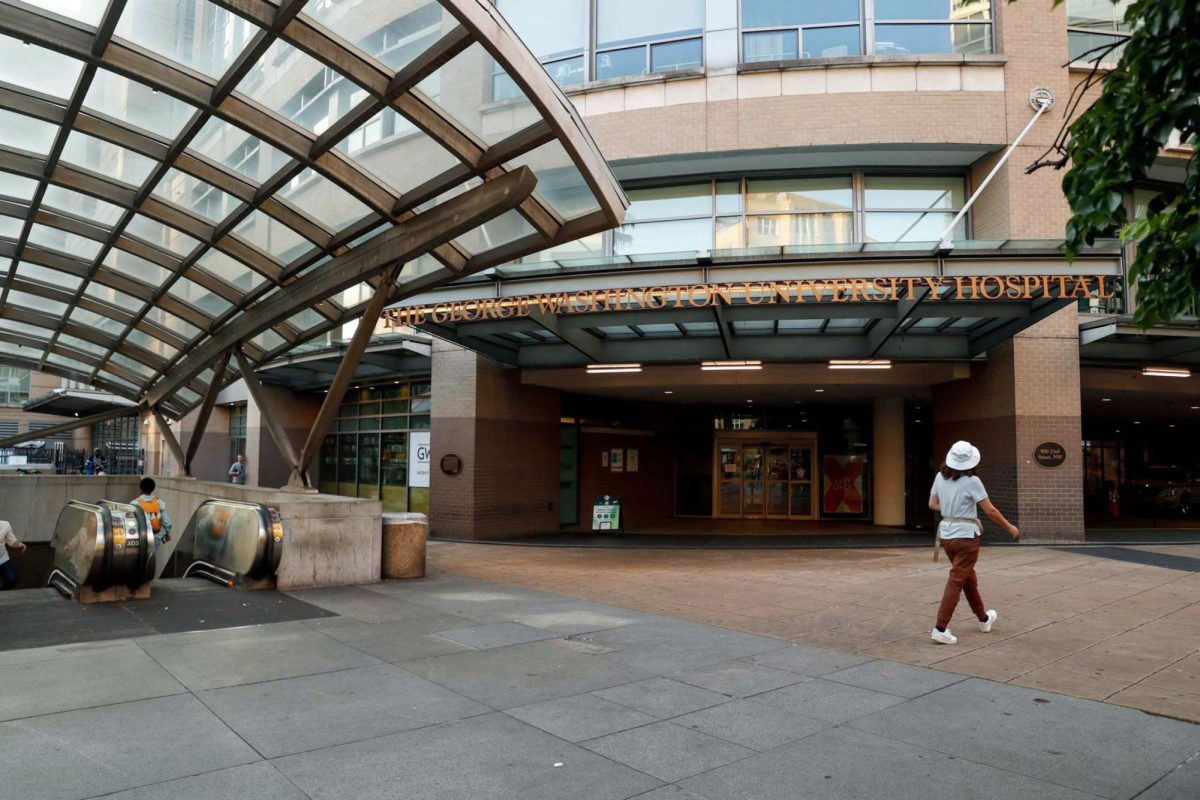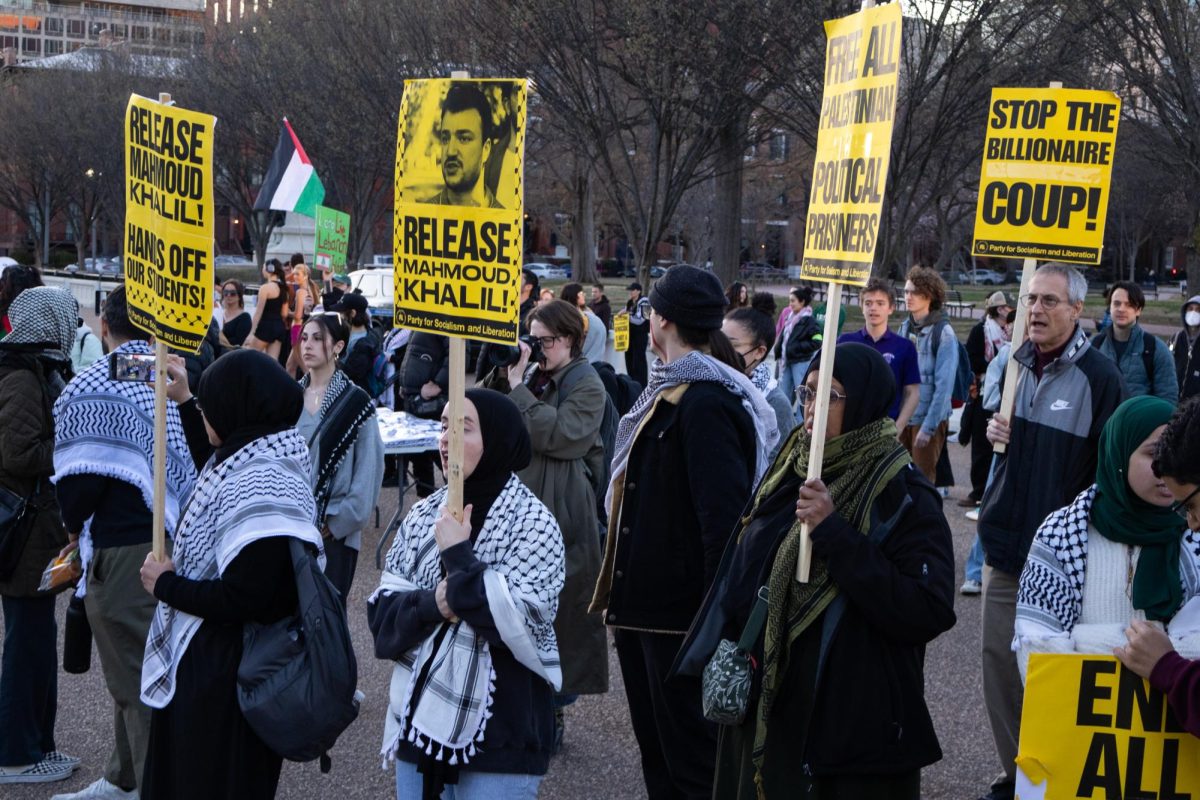The GW Hospital nurses’ union filed five unfair labor practice charges over the last two weeks, indicating renewed tensions over union recognition months after the parties reached a settlement in December.
The unfair labor practice charges — alleging that the hospital fired two nurses and disciplined another for posting union materials — follow a December settlement between the hospital and the District of Columbia Nurses Association that requires the hospital to begin bargaining and comply with several union terms, including allowing union literature in nonwork areas, making hospital bulletin boards available for union use and ceasing surveillance and intimidation of union supporters. The recent unfair labor practice charges allege hospital management may have violated the December settlement by disciplining and firing nurses for posting union materials, coinciding with the parties commencing bargaining meetings last month.
“They’re impeding our ability to get into break rooms and visit and talk to employees,” DCNA Executive Director Ed Smith said.
In July, the National Labor Relations Board summoned GW Hospital to an October court hearing over a trio of instances of unfair labor practices in 2023, including firing a nurse for union activity, privately discouraging union membership and surveilling employees. The NLRB later delayed the hearing to December before the two parties reached the settlement agreement that month.
The December settlement provided front and back pay for Angelo Estrellas, a former registered nurse who GW Hospital suspended and then fired in 2023, which DCNA has said was a result of his involvement in union organization.
Smith said Estrellas received “substantial” compensation but declined to specify the exact amount. Smith said he’s worked as a union representative for more than 35 years, and Estrellas received the largest settlement for one person that he’s seen in his career.
But the new unfair labor practice charges mark an escalation in the yearslong dispute over the nurses’ push for union recognition after they voted to unionize in July 2023.
GW Hospital did not recognize DCNA, the union that represents the nurses, for nearly a year after the union vote, and DCNA filed at least nine unfair labor practice charges since nurses announced their intent to unionize, alleging hospital management tried to block the union’s certification — including through actions as recent as this month.
Smith said the December settlement agreement required GW Hospital to post notice of its terms, adding that DCNA has to “push” the hospital’s compliance officer to increase the number of locations where hospital officials posted the settlement information since December.
Despite the settlement requiring management to restore the union’s access to the hospital’s bulletin boards, DCNA still has “trouble” accessing them, he said.
Smith said DCNA also filed two unfair labor practice charges after management “unilaterally” changed hospital scheduling — one after management reduced the posted schedule from six to eight weeks in advance and one due to scheduling changes in the labor and delivery unit. He said the changes mean employees have less time to “plan their lives” around their work schedule.
GW Hospital did not immediately return a request for comment on the settlement, unfair labor practice charges and bargaining meetings.
In the last month, GW Hospital fired two nurses, Elizabeth Grosh and Trevor Goss-Packard, and issued a final written warning to another, Mary Kelley, Smith said.
Grosh said that on March 7, a manager told her she was under investigation for bringing an unauthorized person into the hospital, and on March 31, the manager told her she would be terminated.
Grosh said she brought a DCNA representative to the hospital to put up union material in a breakroom on Jan. 27. Before the DCNA representative entered, he presented his ID and DCNA business card to a security guard who “didn’t bat an eyelid” and gave the representative a visitor’s wristband, she said.
Grosh has worked at GW Hospital for 35 years and said she “definitely” believes her termination was related to her union affiliation because the security guard authorized the representative’s visit. She said she’s never seen the visitation policy the hospital alleged she violated, even after hospital management fired her.
She added that hospital management suggested she “could cause a danger” to patients but that the DCNA representative never entered intensive care units or areas where patients were present.
“Our purpose was to go to the break rooms where we’re allowed to go to deliver union flyers,” Grosh said. “They said I delivered nonhospital material, which was found in the break room of ICU four. Yes, it was union material. So it clearly was intimidation and definitely targeting.”
Smith said GW Hospital management attributed Goss-Packard’s firing to him using his badge to allow a DCNA staffer and Grosh to enter an ICU. Goss-Packard entered the ICU alone while she and the DCNA staffer went to the break rooms, Grosh said.
Smith said management investigated Kelley for an incident on Jan. 12, when she used her badge to enter a locked unit that she allegedly wasn’t authorized to access while distributing union materials. But he said Kelley, as a union leader, had “every right” based on the December settlement to enter units and break rooms to distribute literature.
“She had every right to go into the units and go into the break rooms and drop literature off, and that’s exactly what she did,” Smith said of Kelley. “We think that’s, again, violative of the statute and the board settlement.”
Smith added that investigations into the three employees didn’t start until after the union and the hospital began bargaining on March 4 and 5, despite all three incidents occurring in January. He said he asked hospital management when they received reports of the incidents, which they “refused” to answer.
Smith said the unfair labor practice charges DCNA filed in response to the firings and disciplinary actions contend that the terminations breached the law and the December settlement.
The initial bargaining meetings — which included DCNA representatives, GW Hospital managers and lawyers representing Universal Health Services, the hospital’s owner and operator — were operating in “good faith,” he said, adding that the parties reached “a couple of minor agreements” on some articles and discussed others.
He declined to specify what articles they discussed but said none “dealt with economics.”
Smith said the union and hospital have additional bargaining meetings planned for April 22 and 23 and two more in May. He said he hopes the parties can schedule additional sessions and in a quicker time frame.
“Thus far, we’ve worked pretty cooperatively with management,” Smith said.





